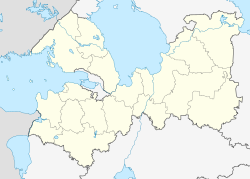Gatchina
| Gatchina (English) Гатчина (Russian) |
|
|---|---|
| - Town - | |
 Roshchinskaya Street in Gatchina |
|
 Location of Leningrad Oblast in Russia |
|
|
|
|
|
|
|
|
|
|
| Town Day | Third Saturday of September |
| Administrative status (as of June 2013) | |
| Country | Russia |
| Federal subject | Leningrad Oblast |
| Administrative district | Gatchinsky District |
| Settlement municipal formation | Gatchinskoye Settlement Municipal Formation |
| Administrative center of | Gatchinsky District, Gatchinskoye Settlement Municipal Formation |
| Municipal status (as of May 2010) | |
| Municipal district | Gatchinsky Municipal District |
| Urban settlement | Gatchinskoye Urban Settlement |
| Administrative center of | Gatchinsky Municipal District, Gatchinskoye Urban Settlement |
| Statistics | |
| Population (2010 Census) | 92,937 inhabitants |
| - Rank in 2010 | 184th |
| Time zone | MSK (UTC+03:00) |
| First mentioned | 1499 |
| Town status since | 1796 |
| Previous names |
Khotchino, Gatchina (until February 14, 1923), Trotsk (until August 2, 1929), Krasnogvardeysk (until January 28, 1944) |
| Postal code(s) | 188300-188310, 188319, 188399 |
| Dialing code(s) | +7 81371 |
|
|
|
| on | |
Gatchina (Russian: Га́тчина) is a town and the administrative center of Gatchinsky District in Leningrad Oblast, Russia, located 45 kilometers (28 mi) south of St. Petersburg by the road leading to Pskov. Population: 92,937 (2010 Census);88,420 (2002 Census);79,714 (1989 Census).
It is a part of the World Heritage Site Saint Petersburg and Related Groups of Monuments.
Khotchino (old name of Gatchina) was first documented in 1499 as a village in possession of Novgorod the Great. In the 17th century, in a series of wars, it passed to Livonia, then to Sweden, and was returned to Russia during the Great Northern War. At that time, Gatchina was a southern vicinity of the new Russian capital, St. Petersburg. In 1708, Gatchina was given by Peter the Great to his sister Natalya Alexeyevna, and after her death, Peter founded an Imperial Hospital and Apothecary here. In 1765, it became the property of Count Orlov. Between 1766 and 1788, Count Orlov built a sombre castle with 600 rooms and laid out an extensive English landscape park over 7 square kilometers (2.7 sq mi), with an adjacent zoo and a horse farm. A triumphal arch was erected to a design by the architect of Gatchina, Antonio Rinaldi (1771, built 1777-1782), forming a monumental entrance.
...
Wikipedia



